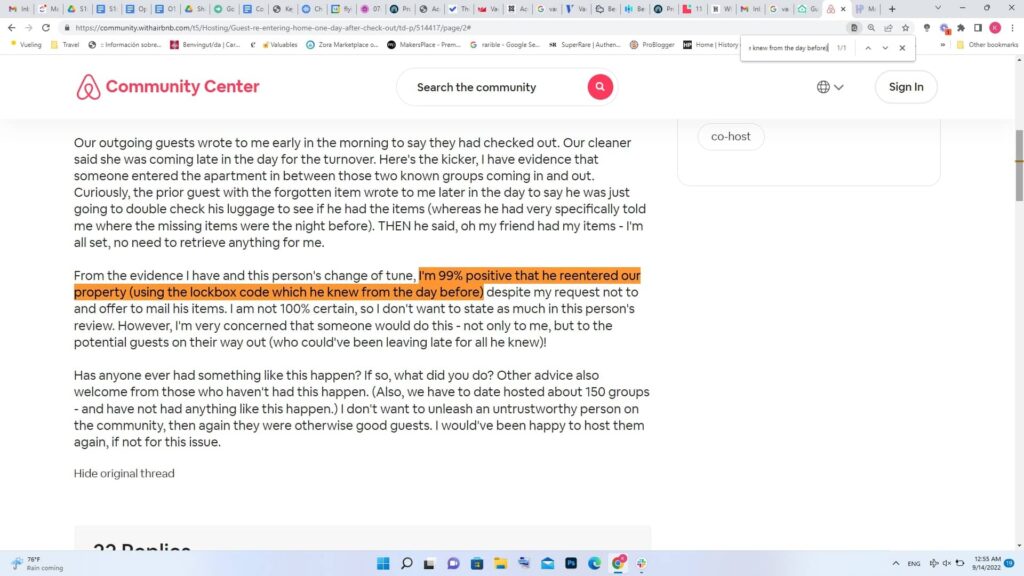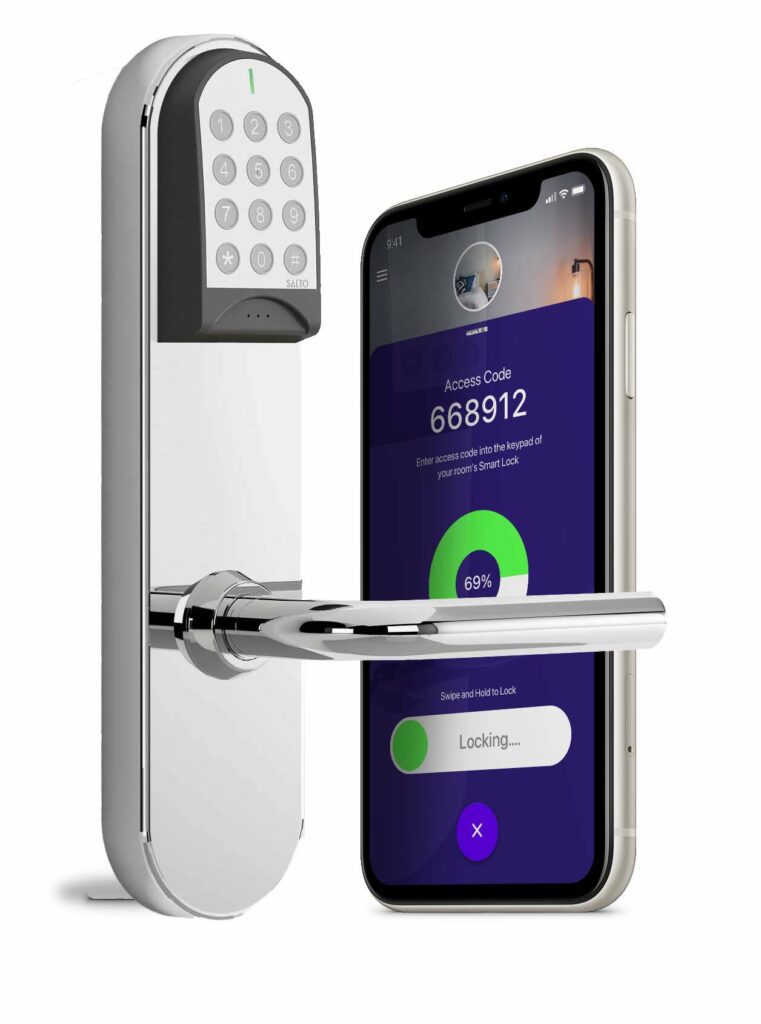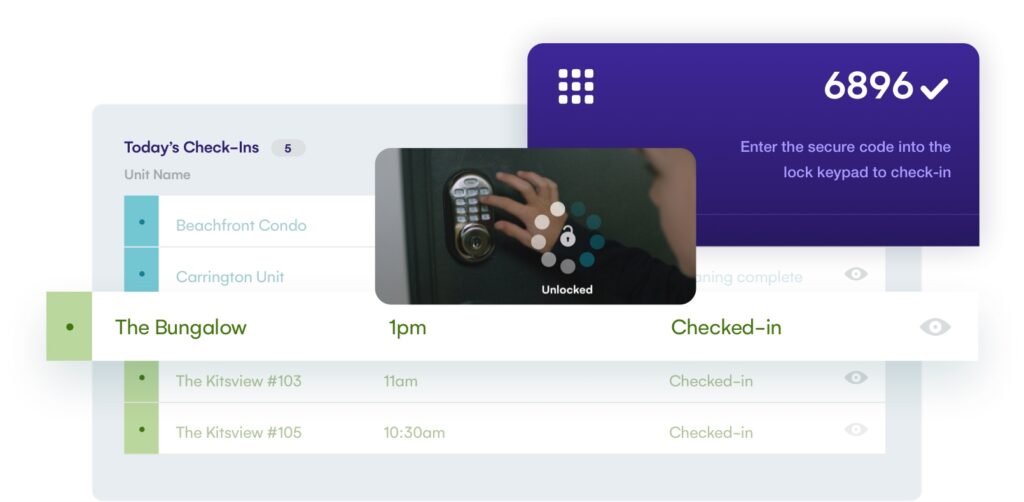THE STR SECURITY PLAYBOOK
CHAPTER 2
Vacation Rental Access Control & Solutions: Essential Guide
Design an access management system that puts security first
When it comes to access control for your vacation rental, knowing there’s a safety issue in the background can be an enormous source of stress, keeping you awake at night.
Or worse, placing the safety of your guests and properties at risk. Scams are rife, and you have no way to guarantee security if there is even a minuscule possibility of key copying or unauthorized entry.
So, solid processes, visibility, and the right hardware and software are essential to maintaining security and confidence across your vacation rental business.
In this article, we’ll look at what you should know about securing your vacation rental and solutions to some of the common challenges that managers face. We’ll help you so that you can rest assured that the properties you manage are safe and sound.
Specifically, we cover the following:
- Vacation rental access: Top security concerns
- Access control solutions: Weighing out your options
- Access management tips
- No hassle, no keys, and complete control
Auto-generate unique access codes for every reservation with Operto Tech.
Vacation rental access: Top security concerns
As managers, you’ve got to be aware of security threats, especially when there’s a regular flow of guests coming and going in and out of properties. Knowing what to look out for and taking precautions will not only reduce your security concerns but will also help you attract new property owners to partner with.
Here are some possible scenarios that can threaten the security of your vacation rental:
Guests re-entering after check-out
Whether they have made a copy of a key, or if they reused an access code, guests re-entering after their stay is a huge concern for vacation rental managers. Here’s an example of how this caused problems for one Airbnb host:

You can see that the guest was able to access the property after check-out, despite the owner asking not to do so.
No matter the policy or communications you may have, something like this can easily happen if a guest has access and is physically able to access a property.
If you still use metal keys, you are also at risk. Even copy-proof locking systems and clever hiding places aren’t enough.
Guests entering before check-in
Another problem area: Guests entering their room before their scheduled check-in time. This is especially true if you have no way of activating their code based on their reservation and arrival time.
If guests access the property too early, you run the risk of them crossing paths with property owners or other guests getting ready to check out. No one wants to deal with these kinds of privacy and security concerns—especially not your guests as they’re packing their things to leave.
Staff entering properties
Security problems can also arise from employees and ex-employees as well. Especially if you have no way of monitoring when maintenance and cleanings of your vacation property take place. If one employee is terminated from their position and the access code hasn’t changed, there’s no guarantee you’ll be able to prevent them from entering again.
Also, if you use the same access code or key for everyone, changing or reprogramming the lock would mean changing it every time a team member leaves. Logistical problems like this can keep you constantly worrying and prevent you from thinking about your business at a higher level.
Access control solutions: Weighing out your options
When it comes to employee and guest access control solutions, you have some choices. You want guests to have easy access to their rooms. Yet, you want to make sure there are measures to protect them during their stay.
Let’s go through some of the pros and cons of each possible solution. That way, you can have a clear understanding of your options before deciding which access control solution is right for you.
Traditional lock and key
Pros: Traditional lock and key systems are very user-friendly. Also, they are economical and easy to install. All that you need to do is make a copy and hand it out to guests.
Cons: Key copying is a security concern. And although the keys themselves are economical, you are at risk of robbery and trespassing. Not to mention, physical keys are easy to lose, which itself can be a time-consuming issue. To have a secure lock and key system in place, you would need to regularly change your lock pad or buy keys that are copy-proof. Both of which can be very costly.
On top of these concerns, managing key exchanges is often inefficient and can result in guests having to wait around after arrival.
Mechanical push button locks
Pros: Mechanical push button locks solve some of the problems mentioned above, like eliminating the need to meet with guests to exchange keys. So they can save you some time when it comes to managing check-in and arranging key drop-offs. Generally speaking, they aren’t complicated to use.
Cons: In order to not face some major security problems, you would need to manually update codes after every checkout. This can require some effort to change the codes, especially if you’re managing several units. Depending on the type of system in place, some require that you remove the lock entirely in order to change the code. Not an ideal solution for managers with dozens of units.
Digital smart locks
Pros: With digital smart locks, there’s no need to be physically present when guests come and go. On top of that, they are much easier to set and reprogram than the mechanical push button locks mentioned above.
Cons: You still need a way to generate unique codes for every guest. Additionally, you will need to look out for a system that allows you to activate and deactivate access codes based on guests’ scheduled check-in/check-out times.


Operto Tech integrates with your PMS to solve your access security issues.
Pro tip: Operto Tech integrates with different brands of smart devices throughout North America and Europe. Here are some of the most popular choices:
- Yale– Offers the possibility of automatic locking. It’s a scalable solution that allows you to control, manage, and reset the lock completely remotely.
- Nuki- A simple and secure, user-friendly tool.
- August- Smart access tools that provide you with visibility and control.
- Salto- Tools that allow you to convert different types of doors into smart doors.
- Igloohome- Uses technology to secure doors offline. Great for places with limited Wi-Fi.
With Operto Connect, you can receive custom notifications that will automatically let you know when a device’s battery is low. Speak to one of our consultants to find the right smart access tool for you.
Access management made simple
When you are looking at updating your access control processes, you need to think about whether or not your practices are scalable.
And you need to be able to know when guests enter properties, when housekeeping comes and goes, and when the properties are empty. The best systems allow you to monitor and manage everything in one place.


To make operations scalable, ideally, you want to automate as much of the process as possible. For this you need to find smart home technology that integrates with your PMS.
Here’s an overview of what fully automated and secure access control looks like from start to finish:
- Phase 1: Guest creates reservation
- Phase 2: Guest information is sent directly from PMS to the integration tool which generates a custom code.
- Phase 3: The unique access code automatically activates when guests check in.
- Phase 4: Guests check out and their code deactivates.
No hassle. No keys. Nothing but complete access control.
We’ve gone over some of the key security problems that you may face, and the best possible solutions.
Without the proper security system in place, you run the risk of previous guests or employees accessing the property without permission. In order to deal with these security concerns, you will need to find a solution that allows you to:
- Automatically generate unique door codes for every guest reservation and every employee.
- Have a system that can activate codes before check-in and deactivate them after check-out.
- See who is entering your rental and when. This is easiest if you can assign custom access codes based on guest reservations.
Curious how Operto Tech generates unique access codes for guests based on your latest booking information, directly from your PMS?